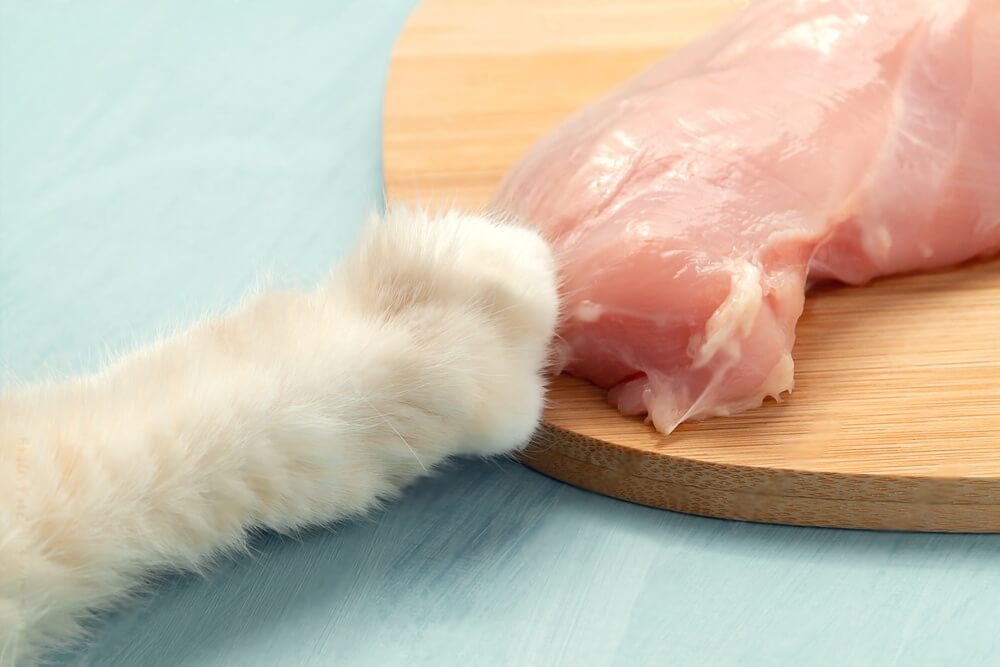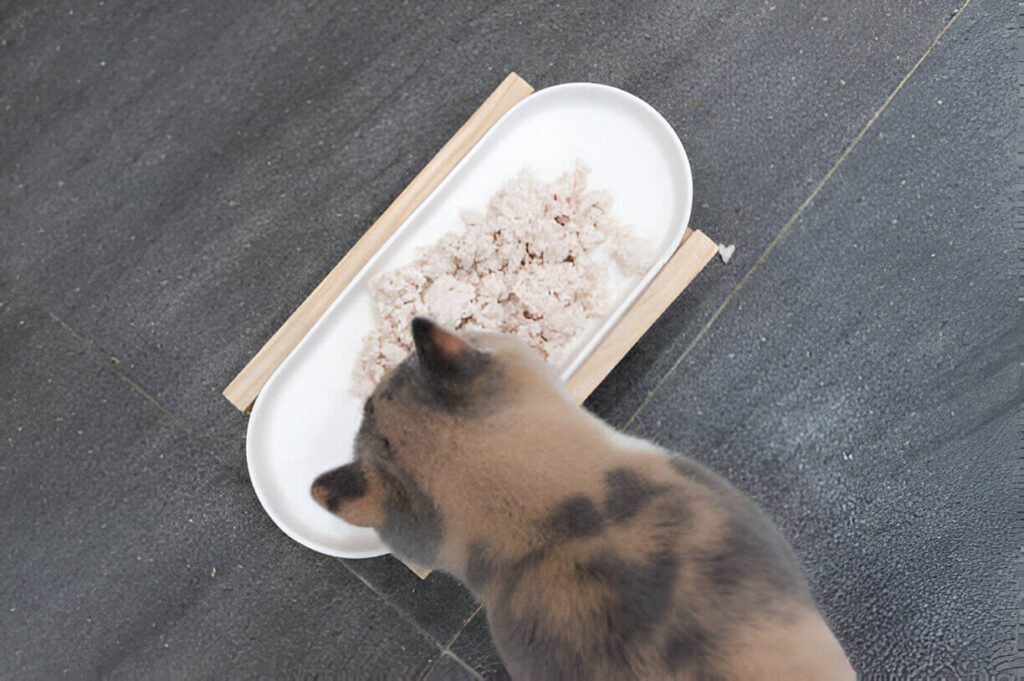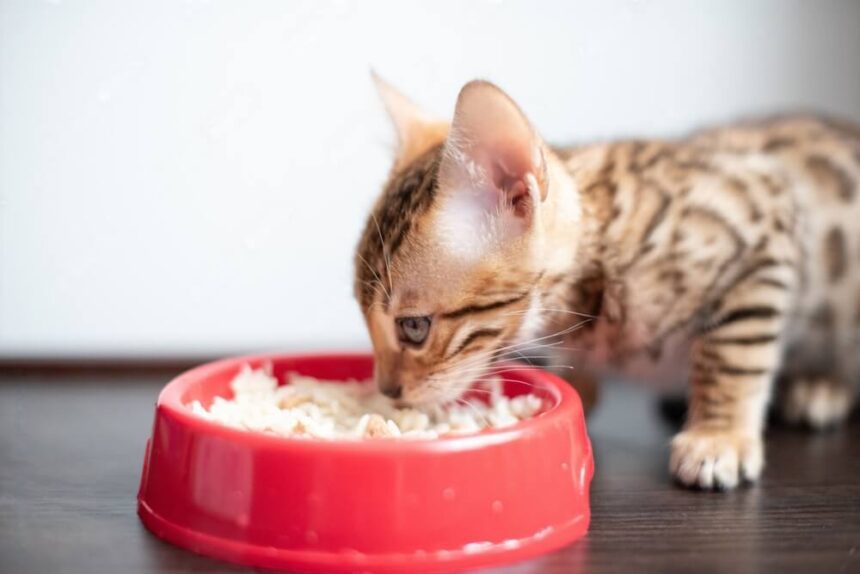So, you’re wondering, can cats eat chicken and rice? This question pops up a lot among cat owners, especially if your furry buddy has a sensitive stomach. Worry not, we’re diving into this topic to give you peace of mind. Let’s get into it!
Understanding a Cat’s Diet
Cats are obligate carnivores, meaning they thrive on meat. Their digestive systems are built to handle animal proteins and fats. While they can digest some carbohydrates, it’s not a primary energy source for them. This difference from humans and even dogs means we have to be careful about what we toss into their food bowls.
Can Cats Eat Chicken and Rice?
Can Cats Eat Chicken?

Yes, cats can eat chicken. In fact, it’s a fantastic source of protein, which is crucial for their muscles, bones, and overall health. However, there are a few caveats:
Cooked is better: Always ensure the chicken is cooked. Raw chicken can carry harmful bacteria like salmonella and E. coli.
No seasoning: Avoid adding salt, spices, or oils. Plain, unseasoned chicken is the way to go.
Boneless: Bones, especially cooked ones, can splinter and cause internal injuries.
Can Cats Eat Rice?
Rice is another story. While it’s not toxic, it’s also not particularly beneficial. Here’s the lowdown:
Digestibility: Cats can digest rice, but it’s not a natural part of their diet. It provides carbs, which aren’t necessary for them.
Moderation: If you’re using rice, do so sparingly. It should never be a significant part of their diet.
Why Chicken and Rice?
So, why do some people recommend chicken and rice for cats? The combo is often suggested for cats with an upset stomach or diarrhea. It’s bland, easy to digest, and can help firm up stools. But, it’s not a long-term dietary solution.
Benefits of Chicken and Rice for Cats

Let’s explore why this meal can be beneficial for your feline friend:
Protein Power: Chicken is packed with protein, which is vital for your cat’s muscles, skin, and fur. Protein deficiency can lead to serious health problems.
Taurine Boost: Chicken is rich in taurine, an amino acid crucial for heart health, vision, and reproduction in cats. They can’t produce taurine on their own, so it’s got to come from their diet.
Low Fat: Lean chicken has low fat content, making it a good option for cats prone to pancreatitis or obesity.
Energy Source: Rice provides a quick source of energy, which is useful if your cat is feeling under the weather.
Digestive Health: The combo is easy on the digestive system, making it ideal for cats recovering from gastrointestinal issues.
The Drawbacks of Chicken and Rice
While there are benefits, there are also some drawbacks:
Allergies: Some cats may be allergic to chicken or grains. Watch for signs like itching, redness, or digestive upset.
Obesity and Diabetes: Too much rice can lead to weight gain and even diabetes. Cats don’t need carbs like humans do.
Nutrient Imbalance: A diet of just chicken and rice can lack essential nutrients. Cats need a balanced diet, including vitamins and minerals found in commercial cat foods.
Preparing Chicken and Rice for Cats
If you decide to give this a go, here’s how you should prepare it:
- Boil the chicken: No seasoning, just plain boiled chicken.
- Cook the rice: Use plain white or brown rice, well-cooked.
- Mix in small amounts: Combine a small amount of chicken and rice, ensuring there’s more chicken than rice.
How Much Chicken and Rice to Feed?
Start with small portions. A couple of tablespoons mixed with their regular food should do. Gradually increase if needed, but don’t make it a regular meal. Always consult with your vet before making significant changes to your cat’s diet.
Can Cats Eat Chicken and Rice Daily?
Nope, feeding your cat chicken and rice daily isn’t recommended. While it’s okay for a short period, like during recovery from an illness, it’s not balanced enough for the long term. Cats need a variety of nutrients that chicken and rice alone can’t provide.
Alternatives to Chicken and Rice
If you’re looking for other bland diets for your cat’s sensitive stomach, consider these alternatives:
- Pumpkin and chicken: Pumpkin is great for digestion and can help with both diarrhea and constipation.
- Boiled fish: A good source of protein and omega-3 fatty acids.
- Commercial sensitive stomach cat foods: These are formulated to provide balanced nutrition while being gentle on the stomach.
When to Consult the Vet
If your cat has ongoing digestive issues, it’s crucial to consult a vet. They can rule out serious conditions and provide tailored dietary advice. Never rely solely on internet advice for long-term health decisions.
Is Rice Bad for Cats?
While not toxic, rice isn’t particularly beneficial either. It’s a filler at best. The risk lies in feeding too much, leading to weight gain and potential health issues like diabetes.
Is Chicken Bad for Cats?
Chicken is generally safe, but moderation is key. Too much can lead to an imbalance in nutrients. Always ensure it’s cooked, boneless, and unseasoned.
FAQs
Can Cats Eat White Rice?
Yes, white rice is easier to digest than brown rice and can be given in small amounts.
Does Cat Food Need Chicken and Rice?
Not necessarily. While some commercial cat foods include these ingredients, it’s more about the balance of nutrients than any one ingredient.
Can Cats Eat Brown Rice?
Yes, but it’s harder to digest than white rice. Use sparingly.
Can Cats Eat Boiled Chicken Every Day?
No, it’s better as a treat or for short-term feeding during illness recovery.
Can Cats Eat Boiled Rice?
Yes, but it should be well-cooked and given in moderation.
The Bottom Line
So, can cats eat chicken and rice? Yes, but it should be done with caution. It’s a good temporary solution for digestive issues but not a permanent dietary staple. Always aim for a balanced diet to keep your feline friend healthy and happy. And remember, when in doubt, ask your vet!



